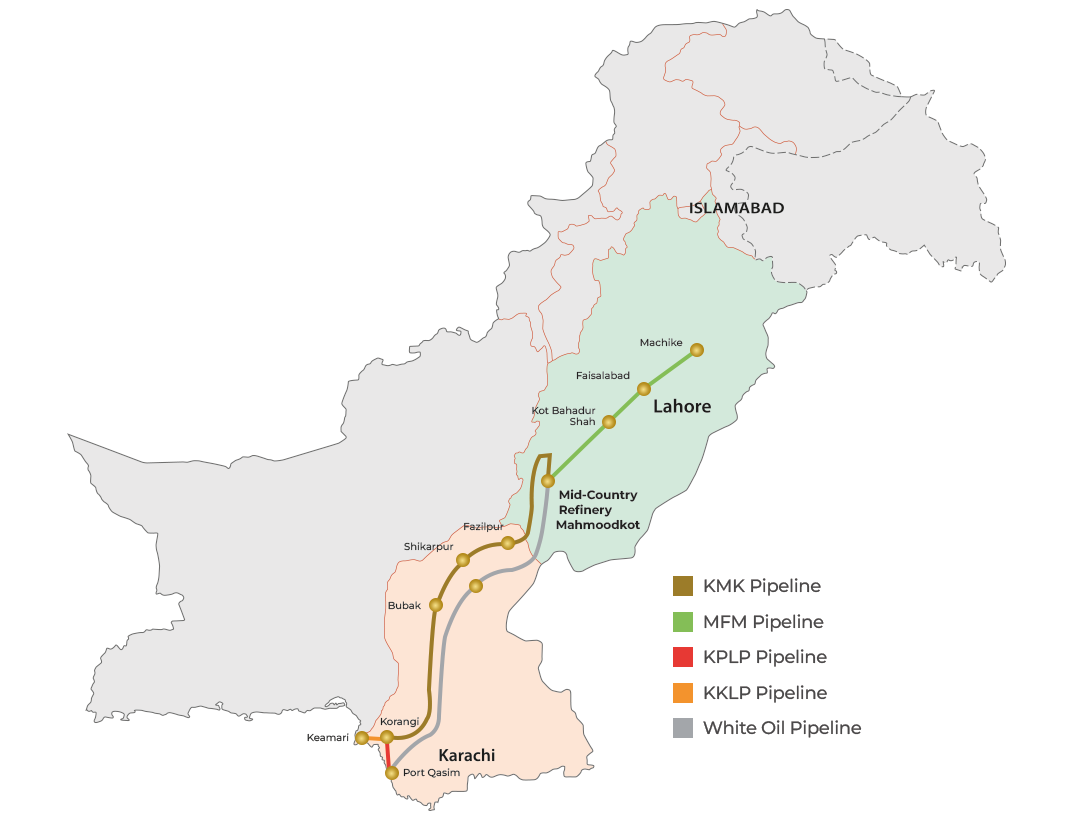Oil Transportation
Oil Transportation
Spanning over 2000 kilometres from Karachi up to Machhike near Lahore, PARCO’s cross-country network of pipelines, including those of its subsidiary – Pak Arab Pipeline Company (PAPCO), play a vital role in oil and transportation across the nation. The pipelines’ presence has led to a significant reduction in environmental harm and road congestion by substituting thousands of tank lorries. This underground river of fluid energy has practically eliminated surface pollution, thefts, product contamination and significantly reduced noise and fatalities related to road transport.

PARCO owns and operates the following pipelines:
Oil Transportation Pipeline System

Karachi-Mahmoodkot Pipeline
- Commissioned in: 1997
- Length: 362 km
- Annual pumping capacity: 3.7 million tons
Mahmoodkot-Faisalabad–Machike (MFM) Pipeline
- Commissioned in: 1997
- Length: 362 km
- Annual pumping capacity: 3.7 million tons
Korangi-Port Qasim Link (KPLP) Pipeline
- Commissioned in: 2006
- Length: 22 km
- Annual pumping capacity: 5.97 million tons
Keamari-Korangi Link (KKLP) Pipeline
- Commissioned in: 1981
- Length: 18.4 Km
- Annual pumping capacity: 10.85 MMT
White Oil Pipeline (WOP)
- Commissioned in: 2005
- Length: 786 km
- Annual pumping capacity: 12 million tons
Korangi
Bubak
Shikarpur
Fazilpur
Mid-Country Refinery Mahmoodkot
Keamari
Port Qasim
Kot Bahadur Shah
Faisalabad
Machike
Karachi-Mahmoodkot Pipeline
- Commissioned in: 1997
- Length: 362 km
- Annual pumping capacity: 3.7 million tons
Mahmoodkot-Faisalabad–Machike (MFM) Pipeline
- Commissioned in: 1997
- Length: 362 km
- Annual pumping capacity: 3.7 million tons
Korangi-Port Qasim Link (KPLP) Pipeline
- Commissioned in: 2006
- Length: 22 km
- Annual pumping capacity: 5.97 million tons
Keamari-Korangi Link (KKLP) Pipeline
- Commissioned in: 1981
- Length: 18.4 Km
- Annual pumping capacity: 10.85 MMT
White Oil Pipeline (WOP)
- Commissioned in: 2005
- Length: 786 km
- Annual pumping capacity: 12 million tons
PARCO employs cutting-edge technology and sophisticated monitoring systems to ensure the integrity and safety of its pipelines. The advanced Supervisory Control and Data Acquisition (SCADA) system continuously monitors the pipelines, detecting any abnormalities or leaks, enabling immediate response and preventive measures. This ensures the protection of the environment as well as the safety of the company’s workforce and surrounding communities.








